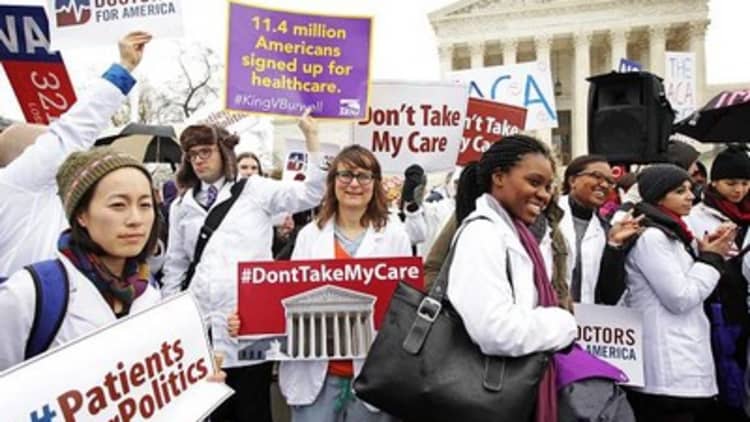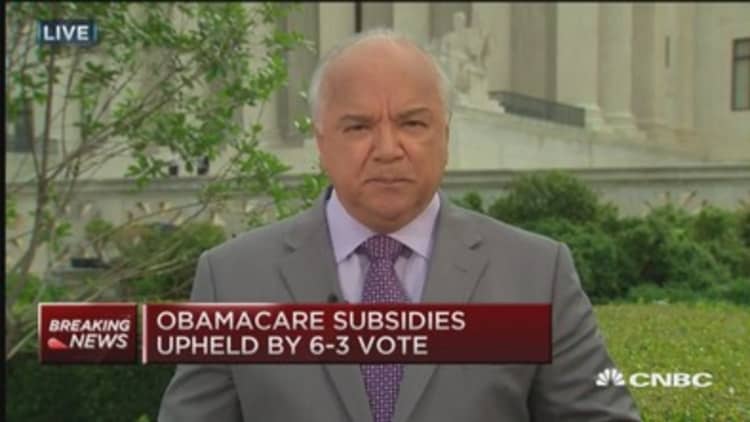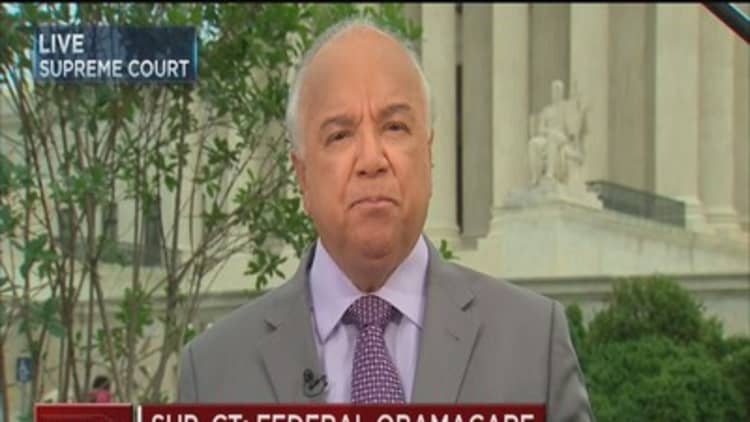


Wait, we might have to do this all over again?
Even as the Supreme Court's decision Thursday killed a major threat to Obamacare, there is yet another case lurking in a lower court that could cause damage to the Affordable Care Act's goal of expanding coverage to people without health insurance.
The lawsuit filed by the House of Representatives in November targets billions of dollars that the federal government spends to reduce out-of-pocket health costs for Obamacare customers with low incomes. Those out-of-pocket costs include co-payments, coinsurance and deductibles that a customer must pay before their health plan covers medical care.
Read MoreWhy Antonin Scalia now mocks conservatives, too
The Republican-led House says those so-called "cost-sharing reduction" payments to insurers are "unconstitutional" because Congress never appropriated the money that the Obama administration has been paying out to insurers to subsidize customers for that purpose.
"Congress has not, and never has, appropriated any funds" for the cost-sharing reduction program, the lawsuit says.
The same suit accuses the administration of violating the ACA by delaying implementation of Obamacare's employer mandate, which requires large employers to offer affordable health coverage to workers or face a fine.
If the House wins the suit pending in federal court in Washington, D.C., and forces the executive branch to stop making the cost-sharing reduction payments to insurers, those insurers face a "very tricky" situation said Larry Levitt, senior vice president at the Kaiser Family Foundation.
"Because the way the law works, the insurers have to cover cost sharing for consumers," Levitt said.
In other words, if the government stops covering customers' out-of-pocket payments, insurers will "have to eat the costs," Levitt said.
Those costs would be high. Nearly 60 percent of the more than 11 million Obamacare exchange customers receive cost-sharing reductions through "silver" health plans. The customers qualify because they earn between 100 percent and 250 percent of the federal poverty level, or $11,670 to $46,680 for an individual.
The reductions are available only to customers of silver plans, which are the second-least expensive category of plans, and which cover an average of 70 percent of the overall cost of members' health benefits.
In its suit, the House noted that the Congressional Budget Office has estimated that the payments to insurers would total about $178 billion from 2014 through 2024.
"Such unconstitutional payments are estimated to exceed $3 billion in fiscal year 2014," the House suit says.
In the absence of Congressional appropriation for that money, the administration has been funding those payments out of the account that subsidizes monthly premiums for most Obamacare customers. Health and Human Services Secretary Sylvia Burwell told Congress last year that was being done on the grounds of "efficiency," the suit noted.
Timothy Jost, a Washington and Lee University law professor and leading Obamacare expert, said that without the cost-sharing reductions from the government, "Insurers would have to significantly raise premiums and might face solvency issues until they could do so."
While many insurers would raise premiums, both inside and outside the Obamacare exchanges, to cover their added costs, some issuers "could leave the market" to avoid dealing with the costs, he said.
Cost-sharing reductions are "a huge thing" for their recipients, and not having them would be a "deal breaker," Jost said.
Read MoreJoy and disappointment after Obamacare ruling
He noted that cost-sharing reductions can turn a silver plan's $5,000 annual deductible into just a $200 deductible.
"Even if you're paying $50 per month for your silver plan [in premiums] if you've got a $5,000 deductible, forget it, you're as good as uninsured," Jost said. Without the cost-sharing reductions, "People are simply not going to be able to afford coverage."
It could be several years before the case is resolved.
The Obama administration is contesting the House's legal standing to even file the suit, though D.C. District Judge Rosemary Collyer has yet to rule on that claim. Jost said there are "strong precedents" that undercut Congress' claim to have standing in the case.
But Collyer appeared sympathetic to the gist of the House's claims when she held a hearing on the standing question last month. She sharply questioned a Justice Department lawyer on his claims that the cost-reduction money fell outside of the normal appropriations and that Congress had legislative avenues to check presidential power.
If she ended up taking the case, and ruling on the factual claims, Collyer's decision would be open to appeal by the losing side. And whichever side lost at the appellate level might then ask the Supreme Court to review the case.
Read MoreObama: Affordable Care Act is 'here to stay'
On Thursday the Supreme Court, by a 6-to-3 margin, ruled that tax credits that help reduce the cost of monthly premiums must be available to Obamacare exchange customers nationwide, not just to those who shop on one of 17 marketplaces run by individual states and the District of Columbia.
The ruling ended nearly a year of speculation that the subsidies for customers of the federal exchange HealthCare.gov would be ended, leading to the loss of coverage for up to 8 million people and skyrocketing premiums in the individual insurance plan market.
Concern about the effects of a ruling going the other way were so high that Republicans in Congress, who opposed Obamacare, were developing contingency plans to continue the subsidies temporarily to avoid suffering a political backlash.
Chief Justice John Roberts, in the majority decision, wrote that "Congress passed the Affordable Care Act to improve health insurance markets, not to destroy them."
Jost said the Supreme Court's decision on the premium subsidies could help the administration defend the cost-sharing reduction payments in the case pending in the D.C. court.
"I think that the Supreme Court's holding that the courts should try to effectuate the purpose of the ACA should encourage the lower court to find a way to effectuate the cost-sharing reduction program," Jost said.


